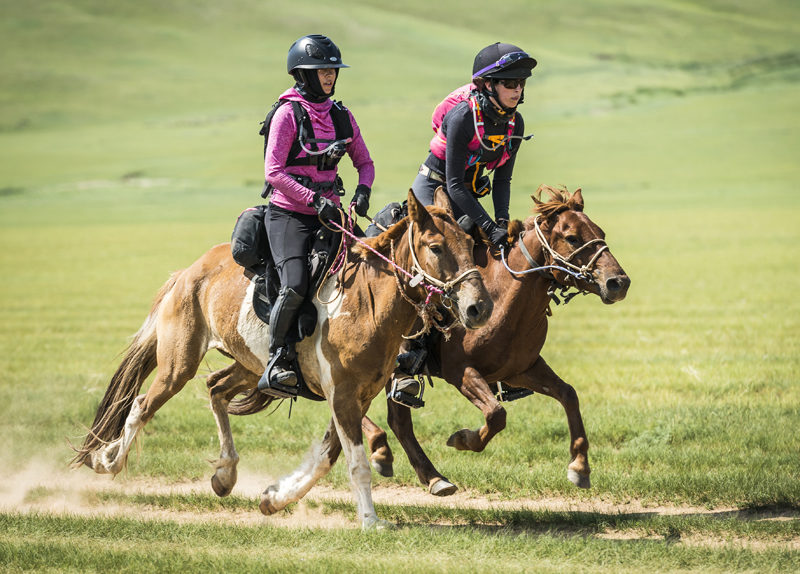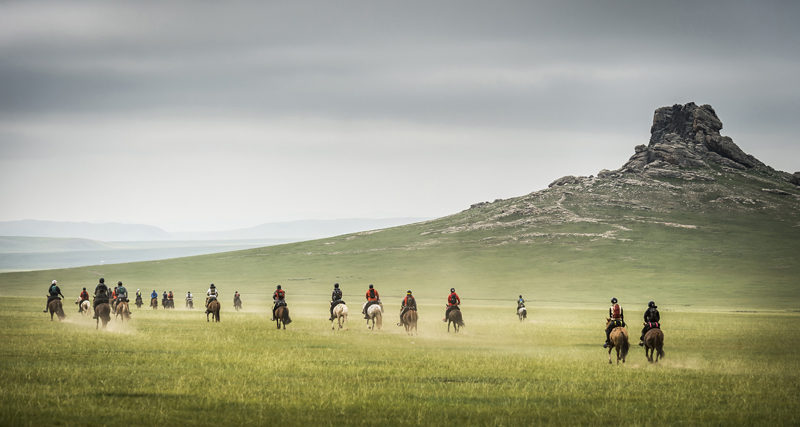
Newcastle native Julia Stewart (right) and another rider compete in the Mongol Derby. (Photo courtesy Richard Dunwoody/richarddunwoodyphotography.com)

Newcastle native Julia Stewart rides in the Mongol Derby, an annual endurance horse race in Mongolia, in August. (Photo courtesy Richard Dunwoody/richarddunwoodyphotography.com)
A Lincoln Academy graduate and former Newcastle resident is back in the U.S. after participating in an endurance horse race across Mongolia during August.
Julia Stewart, of Washington, D.C., competed in the 2016 Mongol Derby, a horse race that currently holds the Guinness World Record title of the longest multi-horse race in the world.
The Mongol Derby was founded in 2009 by a U.K.-based group called The Adventurists. The course is 1,000 kilometers, or 621.37 miles, long, and recreates the horse messenger system developed by Genghis Khan in 1224 through the Mongolian-Manchurian steppe, a temperate grassland in Mongolia. The exact course changes every year and the course is unmarked. Riders are given a series of GPS coordinates to guide them to each horse station. They have 10 days to complete the race.
Riders switch horses approximately every 40 kilometers. The horses, which belong to families who live along the course, are semi-wild.
The entry fee for the race is £8,495, or about $11,218.07, with most of the funds going to charity.
Stewart originally read about the Mongol Derby years ago and had made it her goal to compete in the race since then.
“The challenge was extremely appealing to me, as was the chance to combine several of my passions – riding, travel, culture, and intense experiences,” Stewart said.
Stewart first started riding horses when she was a child. When she was very young, she rode on her neighbors’ ponies, and she started taking riding lessons when she was 8 years old.
Stewart has traveled extensively to races in the past, however, she said she had never participated in a race like the Mongol Derby before. To prepare for the race, Stewart rode as much as she could, ran daily, and did power yoga and Crossfit.
“It still wasn’t enough,” Stewart said. “Even in hindsight, I don’t know how I would have better prepared for the physical endurance that’s required to ride 100 miles a day, many days in a row.”
Riders received training in Mongolia for three days prior to the race’s start date on Aug. 4. In the days leading up to the race, Stewart said she felt confident in her abilities but increasingly nervous as the start date got closer.
“I knew I was a strong rider, but also that many things would be entirely outside of my control,” Stewart said. “As someone who is quite competitive, that was hard for me to deal with throughout the race.”
The Mongol Derby was one of the most important experiences of Stewart’s life, she said. One of her favorite moments happened during a training ride.
“I was mounted on a horse that spent the full hour I was on him running away with me, completely out of control,” Stewart said. “There is a leap of faith that you have to take, to trust that the horse is surefooted … and essentially hang on for the ride.”
Five days into the race, Stewart was riding with two other women in the mountains. As they were riding through a forest, the three began to hear what sounded like opera music.
As Stewart began to wonder if she was so tired or dehydrated she was hearing things, two men and a boy riding a motorcycle passed the three women playing opera on their radio.
The men nodded at the women as if it was perfectly normal to encounter a group of horseback riders wearing adventure racing gear away from anything else, Stewart said.
“It was a moment so surreal that it encompassed the entire experience – exhaustion, beauty, a magical setting, and the sometimes baffling nature of experiences so foreign to your own,” Stewart said.
Stewart was unable to finish the race due to an injury. On the sixth day, she was riding beside a friend. Her friend’s horse fell, and the rider was thrown directly into the path of Stewart’s horse.
The rider spooked Stewart’s horse, which spun and bolted. Exhausted from the 500 kilometers she had ridden in the previous days and distracted by both her friend’s fall and another rider’s simultaneous fall a few hundred yards ahead, Stewart said she let her guard down at a crucial moment.
“The ponies we were riding were semi-wild, and just not horses that you could get distracted on, even momentarily,” Stewart said. “I tried to hang on to my horse, but he panicked, and I got dragged for a short distance before letting go. Both of our horses ran away, leaving us by ourselves, sitting in the middle of nowhere on the steppe.”
All participants in the race were equipped with trackers linked to GPS and had a button for help and an SOS button to be used in case of emergency. Stewart hit her help button, and a crew arrived about an hour later to transport her to a nearby horse station. The next day she was driven to the international hospital in Ulaanbaatar, the capital of Mongolia, which was 12 hours away.
Stewart, who is a pediatric intensive care nurse, said she was impressed with the level of care she received.
“The medical teams in the field were amazing,” Stewart said. “While my injury wasn’t life-threatening, there were many others that were, and they were incredibly competent at delivery of care in one of the most remote locations with limited resources available.”
Stewart returned to the U.S. a few days later. Three people crossed the finish line on the eighth day of the race to win, the first tie in Mongol Derby history.
During her time in Mongolia, Stewart was able to make friends from all over the world, from the riders competing in the derby to the herders whose horses the participants rode throughout the race. Stewart said she has been in contact with the racer she was riding alongside when she had her fall, and the two are trying to figure out how to race again in the future.
“The bond between riders was intense. We were all suffering and all incredibly happy in the same ways, and all went through similar emotions,” Stewart said. “Competition quickly became a very secondary objective. We all wanted to finish, and to support each other in that effort.”
If presented the chance, Stewart said she would love to compete in the Mongol Derby again.
“The logistics are quite daunting, but if I can figure out how to make it happen, I would do it in a heartbeat,” Stewart said. “I feel like I’ve got unfinished business in Mongolia, and a challenge that hasn’t been met yet.”

Mongol Derby participants cross the Mongolian Steppe on the first day of the race. The riders have 10 days to complete the 1,000-kilometer course. (Photo courtesy Richard Dunwoody/richarddunwoodyphotography.com)



